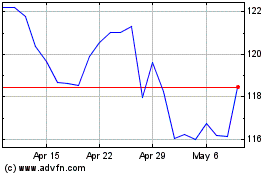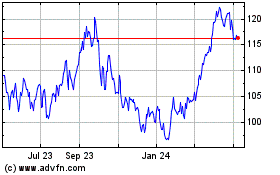By Robbie Whelan and Anthony Harrup
MEXICO CITY--Mexico awarded exploration rights to 19 oil blocks
in the Gulf of Mexico Wednesday, drawing a range of international
oil investors in the second major deep-water auction since the
country opened its energy industry to foreign investment in
2013.
Royal Dutch Shell PLC, the world's second-largest non-state oil
company, was the most aggressive bidder, winning nine of the 19
blocks awarded, four of them alone, four in consortium with Qatar
Petroleum International Ltd. and one alongside Mexican state oil
company Petróleos Mexicanos.
PC Carigali, a subsidiary of Malaysia's Petronas, was involved
in six winning bids, the Qatari state oil company in five, and
Pemex in four winning bids.
Energy officials said investment in the 19 blocks could be as
much as $93 billion if exploration is successful. That compares
with around $60 billion in investments committed in the 69 blocks
awarded in seven previous auctions, which included deep-water,
shallow-water and onshore prospects.
"Today's results speak for themselves," said Aldo Flores,
undersecretary for hydrocarbons at the Energy Ministry, at a press
conference.
The first production from the blocks is expected to come in
2028, and assuming successful exploration, they could produce 1.5
million barrels of oil per day by 2032, Mr. Flores added.
State oil company Pemex produced 1.95 million barrels per day of
crude oil last year, the first time since 1980 that country's
output was below 2 million barrels per day.
Shell was particularly aggressive in bidding on drilling rights
in Perdido, an area rich in oil and natural gas production that
straddles the U.S.-Mexican maritime border in the Gulf of Mexico.
It won exploration rights to five of the nine oil blocks that
Mexico's National Hydrocarbons Commission offered there. Pemex won
another Perdido block on its own, while three went unclaimed.
On the U.S. side, just six miles north of the border, Shell
operates the Perdido Spar platform, the only rig currently
producing oil in the area, which pumps oil from the Great White,
Tobago and Silvertip oilfields. The company says that under nearly
8,000 feet of water, Perdido is the second-deepest oil spar in the
world.
Shell produced about 99 million barrels of crude in the U.S.
Gulf of Mexico in 2017, according to the U.S. Bureau of Ocean
Energy Management, making it the top producer in the area.
"If you just go over the border to U.S. waters, it's already a
proven producing area," said Ruaraidh Montgomery, an analyst with
energy consultancy Wood Mackenzie. "From a geological point of
view, it's not so much a frontier area as it is an established area
... It gives them an established position where they potentially
have line of sight for being there for a number of decades."
No oil has yet been pumped from the Perdido fields on the
Mexican side of the border, although in December 2016, Mexico held
its first-ever deep-water oil auction, awarding rights to four
large Perdido blocks and a joint-venture with Pemex to develop the
nearby Trion oilfield. None of the awards in 2016 were made to
Shell.
The auction coincided with the Wednesday announcement by Shell
of a major exploration find from its deep-water Whale well, also in
the Gulf of Mexico. The company said it had found more than 1,400
feet of oil-bearing pay underneath the well, although the amount of
oil reserves at Whale aren't known.
"Deep water is an important growth priority as we reshape
Shell," said Andy Brown, Shell's upstream director, in a press
statement.
Shell's successful bids on the Mexican side "fit in pretty well
with the Whale discovery that was just announced," said Steven
Otillar, a partner at Akin Gump Strauss Hauer & Feld. "Shell's
also the one that operates the Perdido spar there, so it's a
perfect synergy it seems for them."
After opening up the industry, Mexico has found itself competing
for oil investment with other parts of the world, especially
Brazil.
"In Brazil's last bid round, Exxon Mobil went very strong,
pretty much the way that Shell did here in Mexico. They [Mexico]
understand that they're competing for investment dollars all over
the world," Mr. Otillar said.
Write to Robbie Whelan at robbie.whelan@wsj.com and Anthony
Harrup at anthony.harrup@wsj.com
(END) Dow Jones Newswires
January 31, 2018 17:25 ET (22:25 GMT)
Copyright (c) 2018 Dow Jones & Company, Inc.
Exxon Mobil (NYSE:XOM)
Historical Stock Chart
From Aug 2024 to Sep 2024

Exxon Mobil (NYSE:XOM)
Historical Stock Chart
From Sep 2023 to Sep 2024
